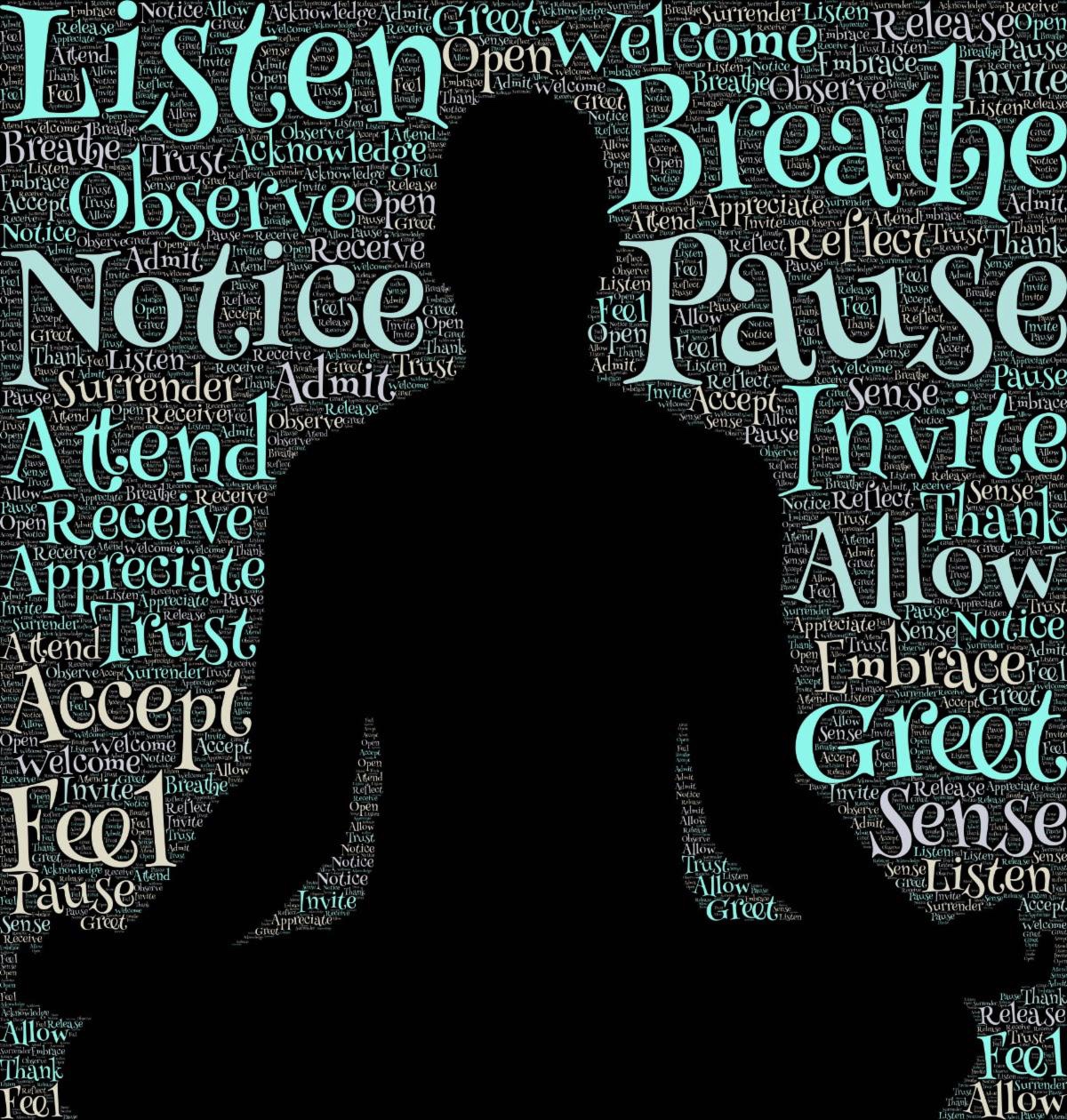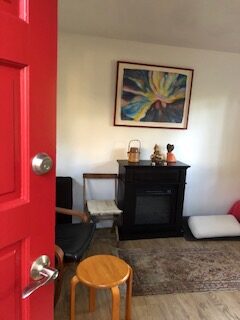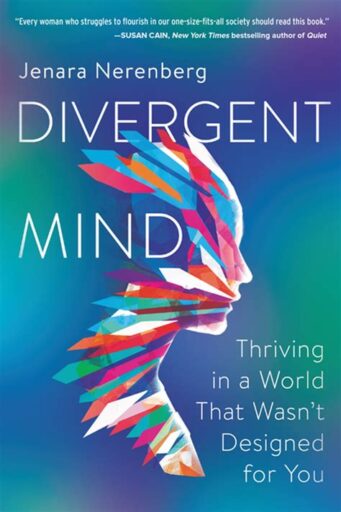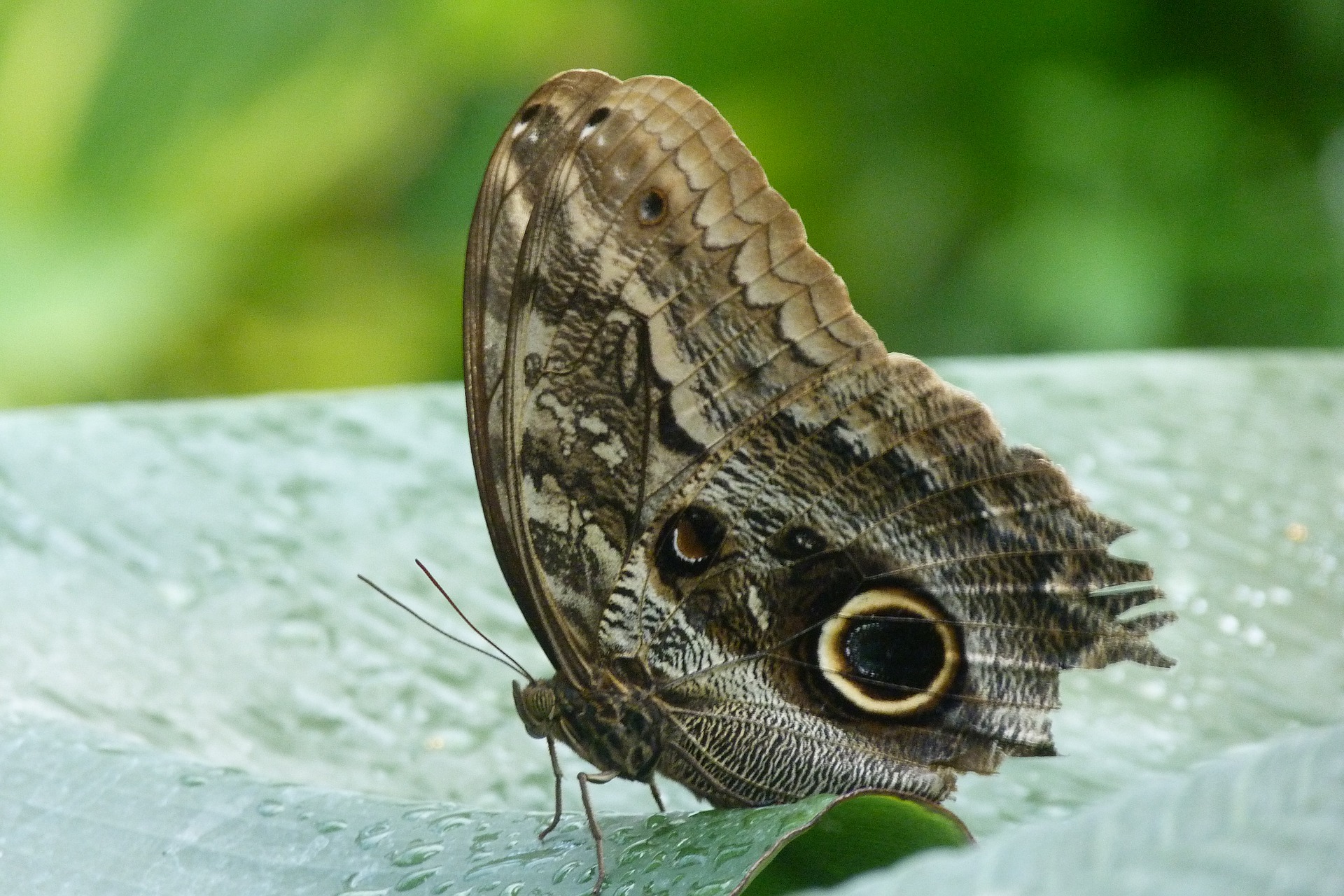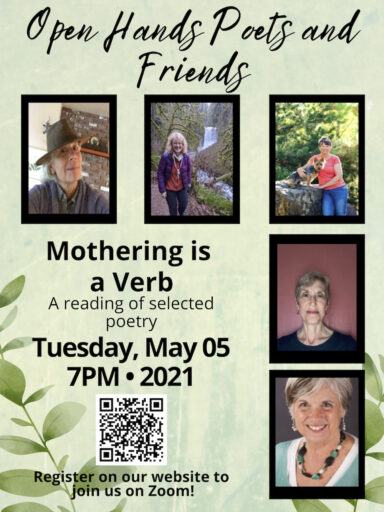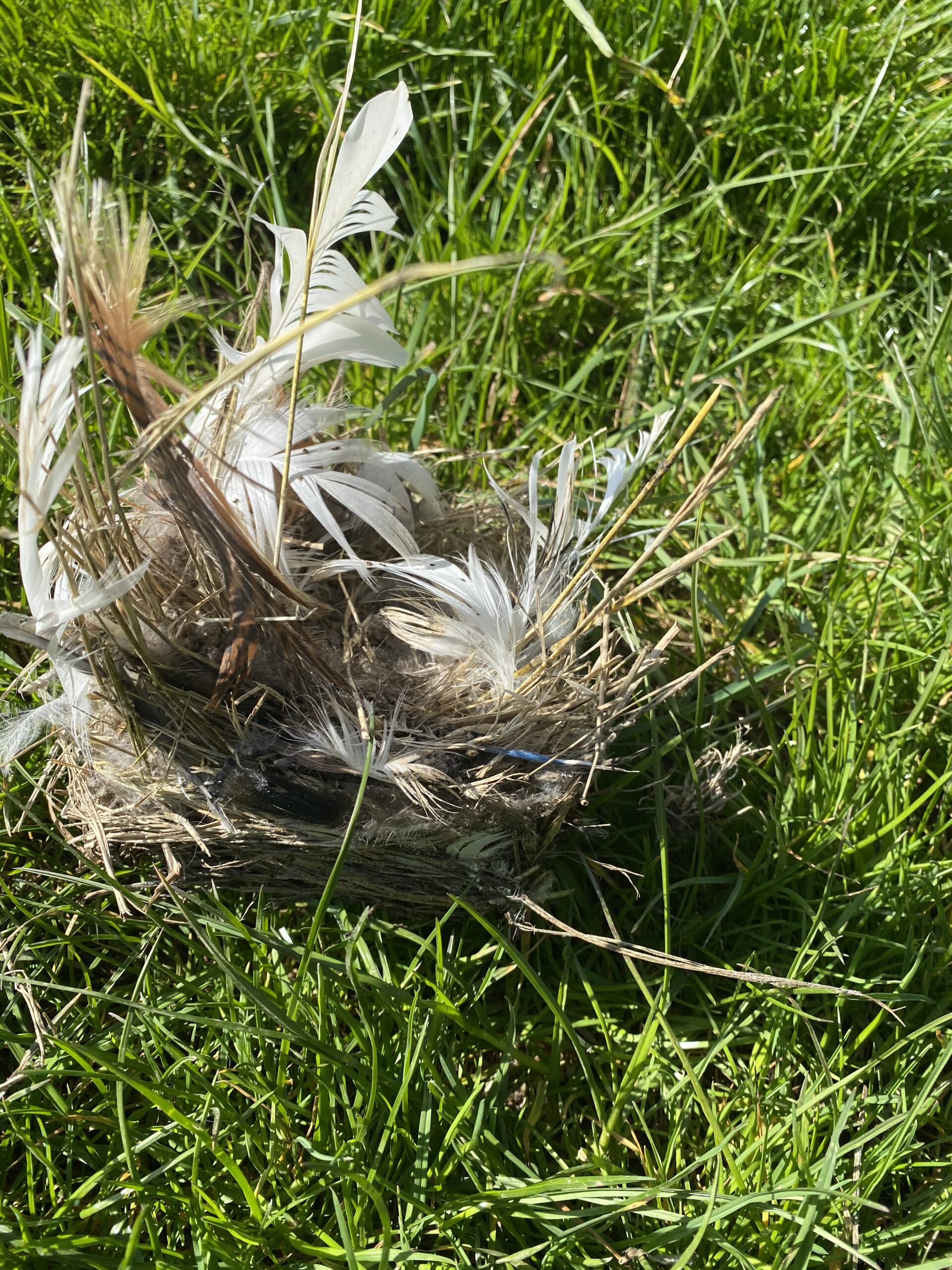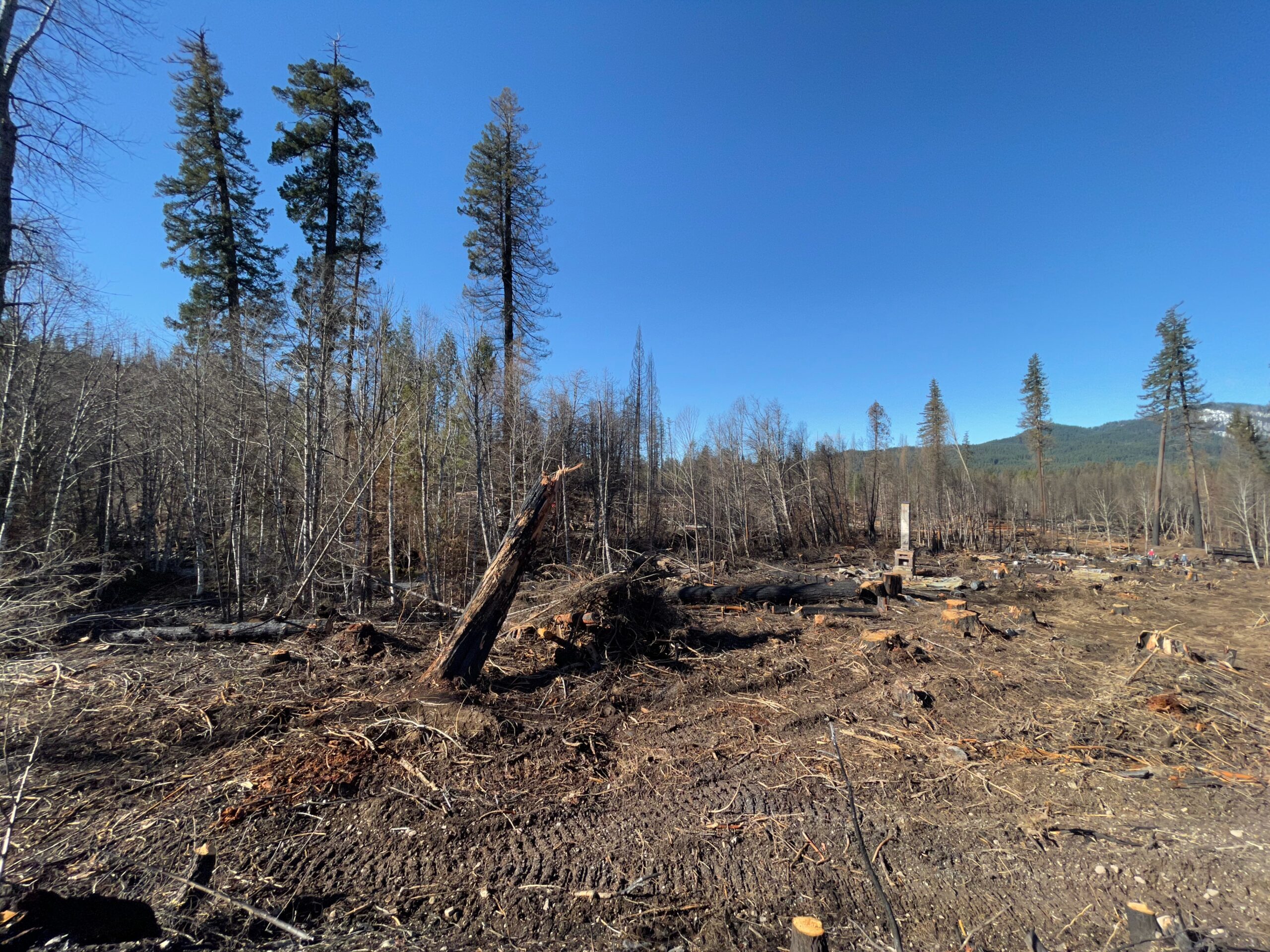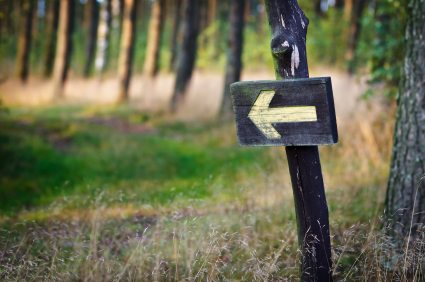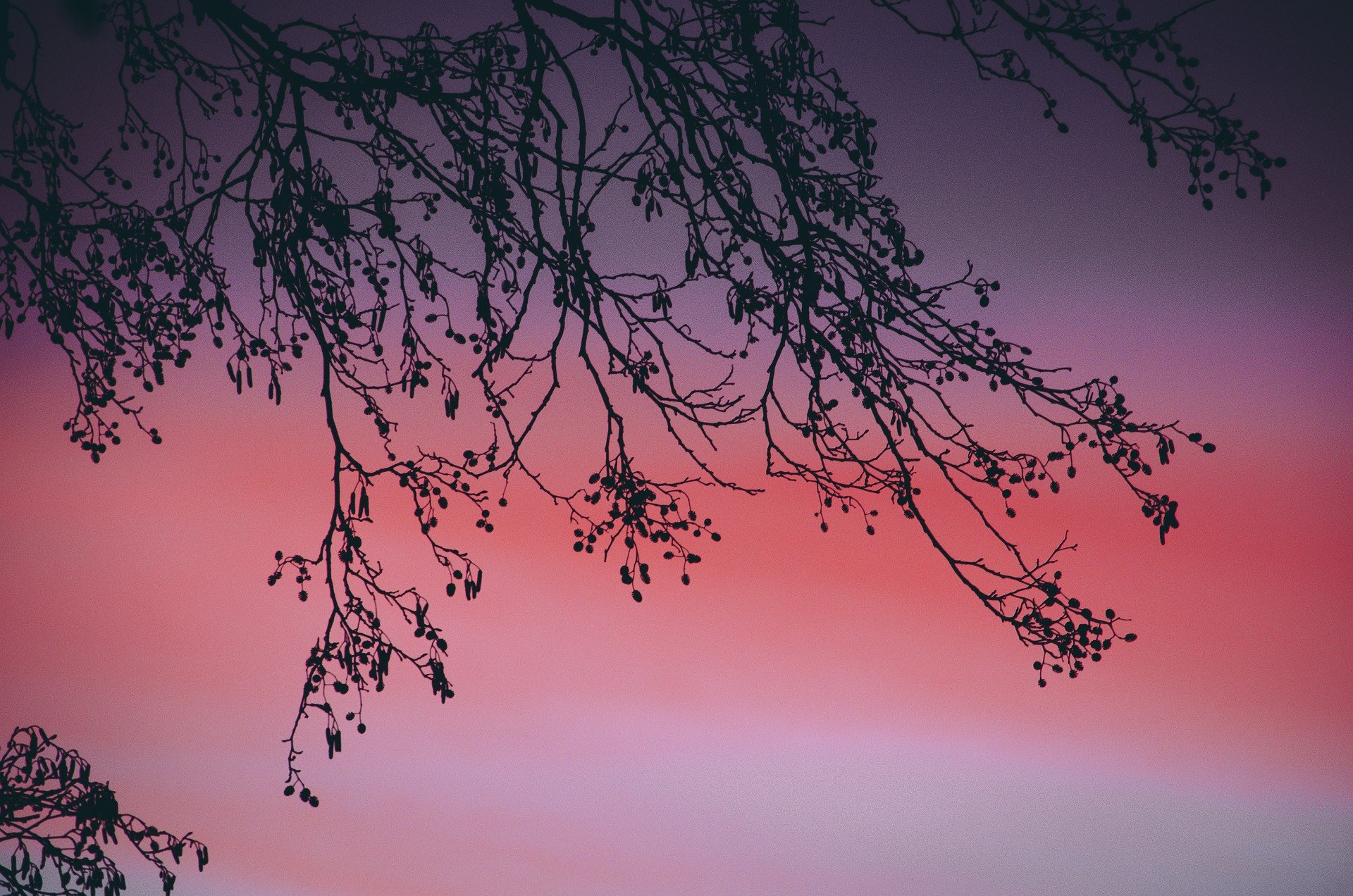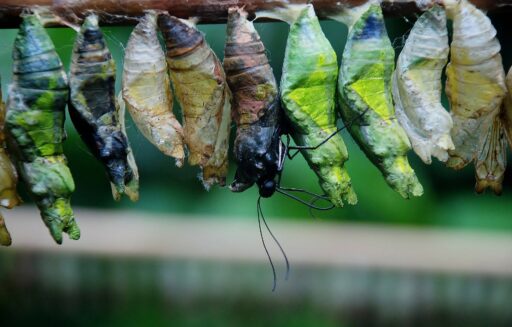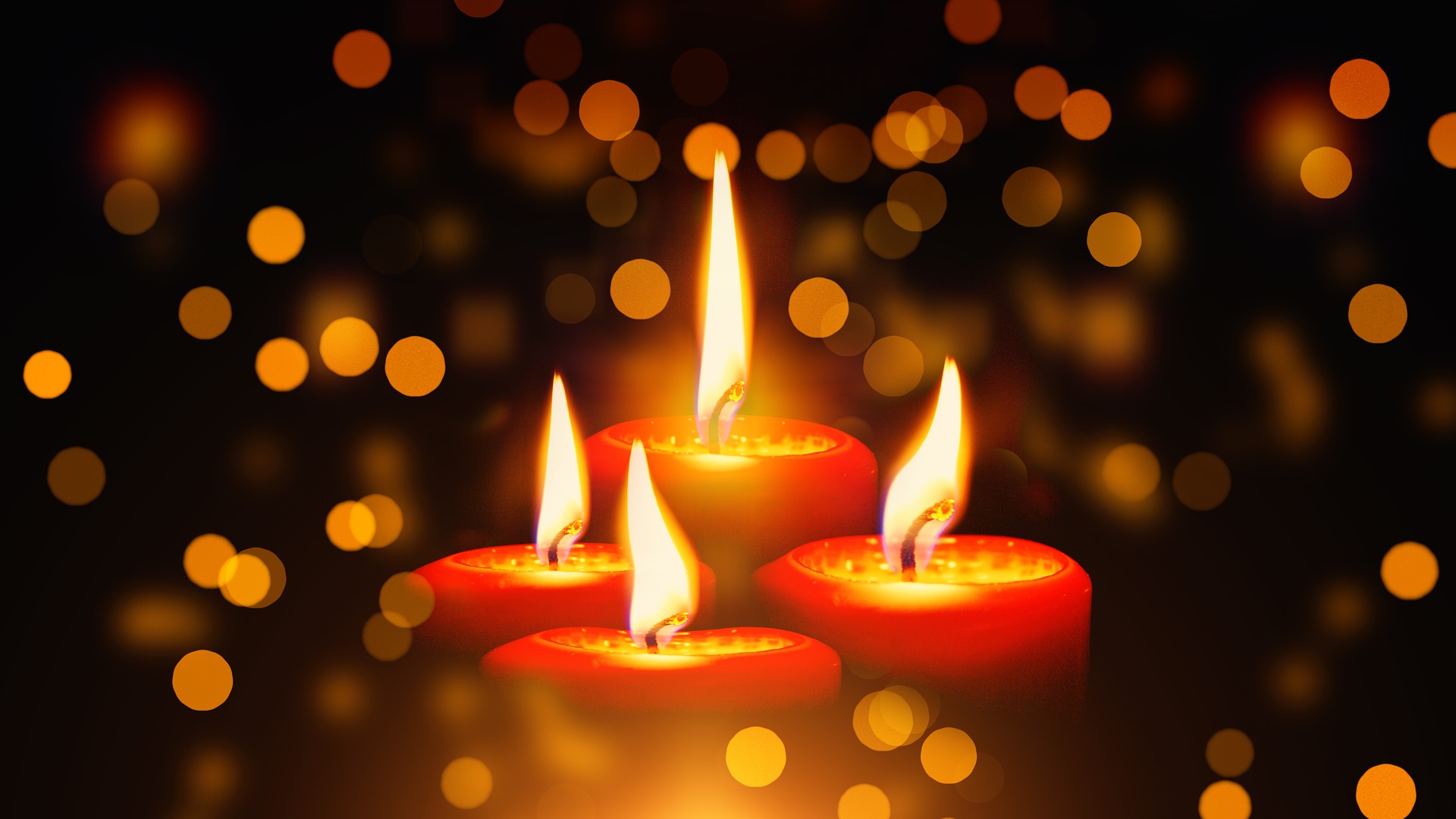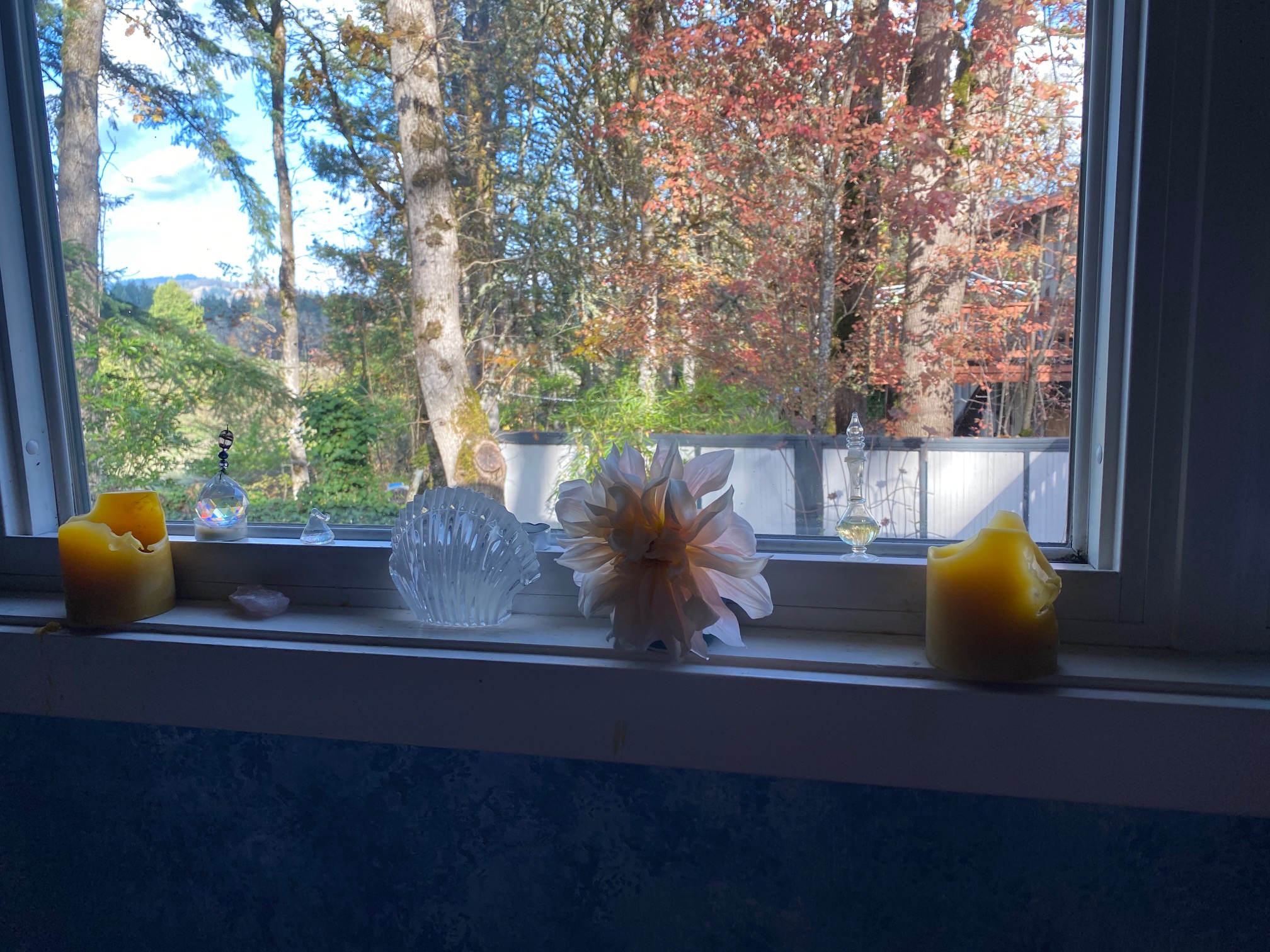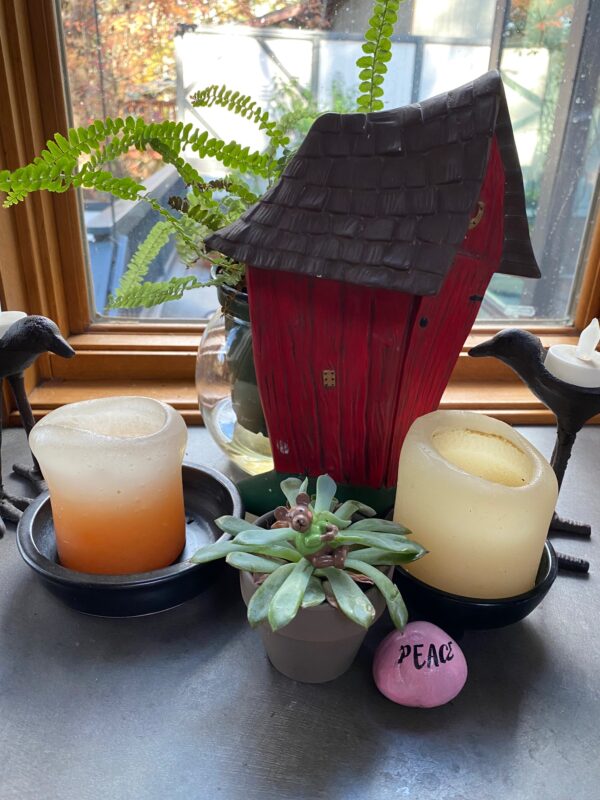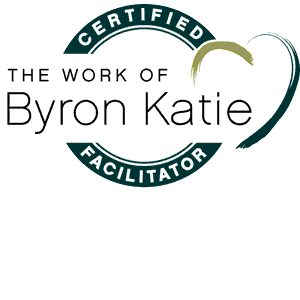Don’t Feed the Fears
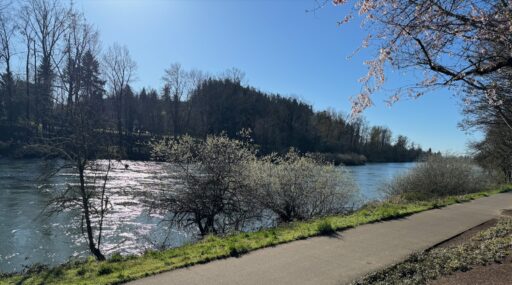
The sign was tucked precariously into the shingles of a house a bit back from the road. When I passed it before, I assumed it was just another treasure a college student had ripped off from the national forest. But yesterday, perhaps because I had new glasses, I doubled back to check it out.
Sure enough. Nothing about Bears. Don’t Feed the Fears it said. Now THAT sounds about right, I thought. And then the question came to me.
What if I could accomplish this in my own lifetime? What if I could truly learn to refrain from feeding the fears that come with most any challenge?
Let me just say It would be a miracle.
And I believe in miracles.
Love is Letting Go of Fear was my favorite go-to for the entire decade of the 1980’s, when I was submerged in mothering two young children.
There were times when I might have taken it a bit far, like the day I noticed my daughter, not yet three, perched at the top of a slide. Was she hesitant, waiting for my permission? I ran to the slide, but she was already propelling down the chute, coming close to landing on her still somewhat bald head. For years I would laugh about my struggles conveying to her “a decent sense of fear.”
Later I learned there was another name for the challenge of raising both my kids. ADHD. What I’ve learned from this entire experience would fill at least a book or two (and one I already wrote. Literally). But what I have left to learn about neurodiversity could fill far more pages. And continue to offer valuable perspective, as I’m still learning.
But what I’m thinking about nowadays is more basic yet. What simple mantra has been my guide over the years? It could be summarized in the very same three words: Don’t Feed the Fears.
I’ve traveled to retreats, embracing meditation, holy listening, and inquiry. I’ve continued to discover that generalized “fear” includes death and chronic debilitating illness, the things that I see beloved friends facing head-on nowadays. The Big Things.
I’m learning to make enough space in my life for the silence I need to take inspiration from the snowdrops and hyacinths pushing their way up just outside the walls of daily routine. I’m taking this poem by May Sarton with me as I spend a few days in my tiny meditation/writing hut, where I’ll be joining other meditators at a semi-silent online retreat. My goal is to allow this busy mind to trust the way of all other living things this Spring.
I want to begin with curiosity about how the next passages of life might look if I truly learned life lessons and took inspiration from the simple mantra, Don’t Feed the Fears.
The Short Story of My Shadow and Me
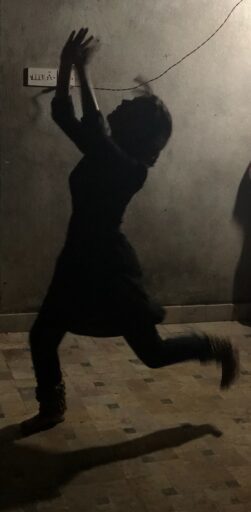
Once I tried to give away my shadow.
It wasn’t easy. More like downright terrifying.
I was launching my new book,
Putting Your Best Foot Forward:
a PR Guide to Life™ Suddenly I saw that my foot wasn’t the problem.
It was my shadow.
Such a mouth it had. Always with a snappy comebacks
Always with the opinions,
Always with the surprises.
It was time to move it along,
and so I started low.to the earth
with Groundhog, squatting at his burrow door.
(He was known to be cranky this time of year so I whispered).
You can use my shadow as a backup,
I gently suggested.
You might be more predictable,
He curled his lip and bared his incisors
I’ve got enough shadow
worries on my own without yours,
he snarled, And besides, It won’t fit!
Plan A (The Giveaway) was out.
Plan B (Direct Persuasion) was in.
Moon Shadows are kinder than Day Shadows, and so we met under a full moon.
Thank you so much for your service,.
Perhaps retirement might suit you, I suggested.,
I kept the argument civil, logical,
Sensitive to its needs.
But the nicer I was the nastier the response.
until I noticed my collar getting very hot,
and I heard myself saying
Okay then, I’m done trying to figure this out.
Let me make it clear: I don’t need you anymore.
And what if I refuse? It asked,
After that there were no other words,
only a dark pressure in my midnight mind,
a burrowing into my chest,
a sense of something crouching
Somewhere deep and out of reach.
And so I guess it’s the two of us now,
and I know that I will never see
the dance we do together, my shadow and me.
Transfusion of the Heart

Transfusion of the Heart
I’m certainly no stranger to life’s unpredictable heartbreak and loss. Lately, like most of my peers in the Youngish Elder category, I notice my brain and body are a little more fatigued from the surprises of each year as it passes. It seems as if the pace has been increasing lately, and there’s good evidence for this claim. But nobody wants to be re-traumatized by visiting that list of surprises.
While there’s certainly increased cultural and environmental grief, the predictable vicissitudes of aging can’t be ignored. With all my replaced and updated parts, right now my biggest problem is a brain that seems way too eager to drop names (or nouns in general) if it deems them unnecessary. A couple of my very dearest friends, slammed with sobering diagnoses, haven’t been so lucky. I’ve taken just about everything having to do with my health and life force for granted.
In my life there are many blessings I try not to ignore. In my role as life coach for a small list of clients I nearly always find renewed energy and inspiration. My family is healthy and mostly thriving. There have been no major wildfires near us for the last couple of years. For these things and more I am truly grateful.
When I haven’t been so lucky in big ways and small, resilience has found me and showed me the way. It hasn’t let me down. But this year it’s a gradual anemia of heart that seems to want my attention, especially as I peek into the next year and realize the seriousness of the challenges we face as a people. Just imagining possible futures is enough to fatigue a person who’s been doing a pretty good job of treading water.
I know in my depths that resilience alone won’t do the trick long-term. I think I need a reboot, while I’m still walking in these boots. I recently felt inspired by these lines from Naomi Shihab Nye’s poem How to Disappear:
Walk around feeling like a leaf.
Know you could tumble any second.
Then decide what to do with your time.
Such is life in my seventies. A concoction of gratitude and fatigue. A mixture of hope and acceptance, tempered by the lessons of reality. Learning to pause to let life show me the way.
I can’t see the future clearly, but I’m encouraged by a humbled understanding of the value of the basic components of life.
As gifted songwriter Laura Nyro advised, “Nothing cures like time and love.” These are the healing cures for almost anything. But it’s especially true for Anemia of the Heart.
Time. Love. This feels just about right. May the next year bring you ample quantities of these two essential ingredients. And may this transfusion renew your heart and increase your peace as you move forth.
Susan Grace
|
The Promise of a New Year Winter moon smudges Halo of hope a smeared rainbow in dark charcoal sky Erasing the world Of my daily re-creation, leaving only a hint of life before now. and a vague moon print of future revelation — SgB 2024 |
|
photo by George Beekman |
Twisting, Bending, and Holiday Nirvana
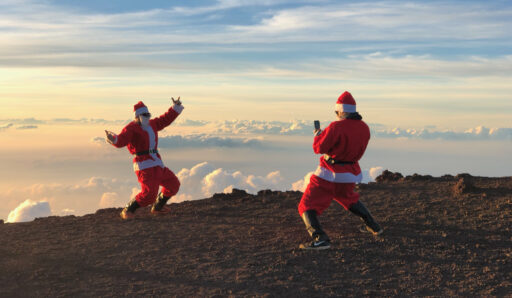
A couple of weeks ago, only a few days I after I wrote a blog about my firm resolution to pay attention to my body’s subtle cues, I had a little stumble, a little fall, resulting in some sore ribs. Nothing I couldn’t ignore.
A couple of days later, congratulating myself on my quick recovery, I went back to my regular yoga class. As I twisted and then stretched into a forward bend, I felt a slight click, something I had always called an adjustment, For a moment I thought I that once again yoga had offered its magical relief. As I began to move into Tadasana, a muscle spasm took me to the floor. What had felt delicious the day before prevented me from getting off my mat, and I only got into a wheel chair with the help of friends.
For the week that followed, which included a long holiday, a muscle spasm got my attention nearly full-time, day and night, So much for subtle listening. I’m not saying that there weren’t certain benefits to being served a turkey dinner by my family, but to tell the truth it wasn’t worth it.
Since then, a couple of gifted bodywork detectives helped me to trace the injury to hyper flexibility, something I had thought was a good thing. What a revelation! I’m told by my best allies that without enough strength, flexibility can be dangerous. Apparently my muscles came to the rescue when they seized, protecting those fragile ribs and the essential organs beneath them. What a clever body! But hardly subtle; apparently this is what it took to get my attention.
I had plenty of time to lie around and reflect on the situation, a yummy opportunity for a metaphor junkie. And what I noticed is that my usual habit to tend, to befriend, to find harmony with win/win solutions, has basically resulted in the habit of back-bending a bit too far. Occasionally all this stretching and allowing has cost me money. But more often the cost is hidden. When I abandon my own strong knowing, it may please others, but it takes a good while to begin to trust myself again.
As luck would have it, this is also the holiday season. The exact time that the Back Bender tends to take over, for all the seasonal reasons, both joyous and overwrought.
As I hauled my yoga mat up the stairs to class today, the pain was gone. I know the strength will return in its own time.
Gradually my body will thank me for my patience. Or, better yet, it won’t have the need to yell at me to get my attention. Now that sounds like a perfect gift for the two of us, my body and me.
May you find joy in standing firm this season, even as you embrace the flexibility of an open mind. May you listen to your body’s wise guidance, even as you celebrate all the life it gives.
